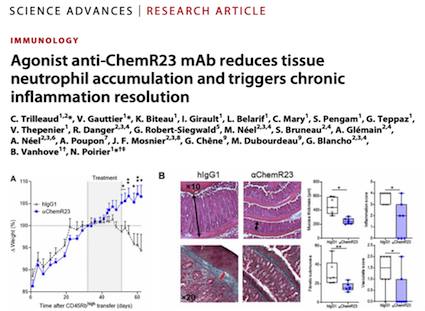Ambiotis is very proud to have actively participated with OSE Immunotherapeutics to the development of an antibody that targets resolution of inflammation pathways. ChemR23 is a GPCR targeted by Resolvin E1. OSE-230 is an anti-ChemR23 agonist antibody that have been shown to promote efferocytosis (clearance of dead cells by macrophages) and reduce apoptosis of neutrophils; major hallmarks of inflammation resolution. It also triggered resolution in chronic colitis model with beneficial impact on tissue lesions, fibrosis and inflammation-driven tumors. This is a first-in-class drug dealing with pro-resolutive properties.
Check the publication here :“Agonist anti-ChemR23 mAb reduces tissue neutrophil accumulation and triggers chronic inflammation”.
The Ambiotis news


A good inflammation resolution is associated with a correct healing and tissue repair. Ambiotis has recently developed new approaches in the area of healing, remodeling and regeneration. Our scratch assay allows the accurate evaluation of compound capacity to accelerate healing. It can be combined with biochemical analysis of lipids or cytokines. Our model of fibroblasts in co-culture with macrophages is perfectly suitable to observe the impact of compounds on the switch from pro-inflammatory to regenerative macrophages, the production of lipids involved in healing process (MCTR) and the remodeling of the extracellular matrix.

Phagocytosis is one of the hallmark of inflammation resolution. Ambiotis has developed an assay to monitor phagocytosis in kinetic using High Content Imaging system and evaluate influence of compounds.
Images are then quantified with our partner IMACTIV 3D, a specialist of image analysis.



